
High-rise residential buildings
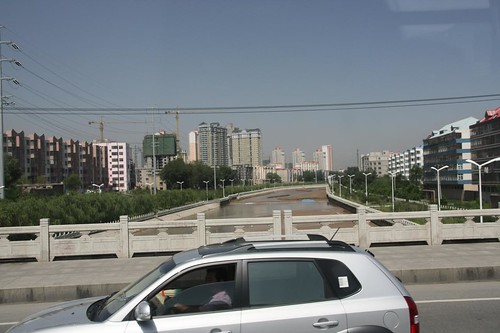
Man working with a big tyre

People walking about in the streets

Random street

Road works

Heading to the countryside with beautiful green grassland and yellow rape fields


"Situated 40 kilometers (25 miles) from southwest of Huangyuan County in Xining, Riyue (Sun and Moon) Mountain marks the boundary between the eastern agricultural area and the western pastoral area of Qinghai Province. From the top of the mountain there is a superb panorama of the beautiful landscape - both prairie and farmland. It is 3,520 meters (11,549 feet) above the sea level and is believed to be the only road to the Qinghai-Tibet Plateau.
Born with the name of Chi (Red) Ridge, the Riyue (Sun Moon) Mountain had been an important thoroughfare to western China for many years and a crucial link between Han and Zang (Tibetan) people. There is a legend concerning the mountain: In the Tang Dynasty (618-907), the emperor gave in marriage his daughter, Princess Wencheng, to the leader of Tibet, Songtsen Gampo to improve the relationship between the two nations.
When the princess reached this mountain and took a break, she felt a surge of homesickness. She took out the precious Riyue Mirror given to her by her father because she was told that it would show her hometown while yearning for her home. But she resolutely threw down the mirror so as not to miss her country any more, and continued her journey to the west. The mirror was broken in two pieces shaped like the moon and sun. From then, the mountain got its name, Riyue Mountain.
The Ri (Sun) Pavilion and the Yue (Moon) Pavilion were built on each side of the mountain pass in memory of Princess Wencheng. Vivid murals are painted to re-create the scene when the princess enters Tibet and her life there. In the twin pavilions, the Yue Pavilion particularly depicts the great pomp of the cultural communication Princess Wencheng brought to Tibet, including crop seeds, technology, medicine, and Buddhism. It was she who brought civilization to Tibet." - http://www.visitourchina.com/guide/riyue_mountain.htm
Born with the name of Chi (Red) Ridge, the Riyue (Sun Moon) Mountain had been an important thoroughfare to western China for many years and a crucial link between Han and Zang (Tibetan) people. There is a legend concerning the mountain: In the Tang Dynasty (618-907), the emperor gave in marriage his daughter, Princess Wencheng, to the leader of Tibet, Songtsen Gampo to improve the relationship between the two nations.
When the princess reached this mountain and took a break, she felt a surge of homesickness. She took out the precious Riyue Mirror given to her by her father because she was told that it would show her hometown while yearning for her home. But she resolutely threw down the mirror so as not to miss her country any more, and continued her journey to the west. The mirror was broken in two pieces shaped like the moon and sun. From then, the mountain got its name, Riyue Mountain.
The Ri (Sun) Pavilion and the Yue (Moon) Pavilion were built on each side of the mountain pass in memory of Princess Wencheng. Vivid murals are painted to re-create the scene when the princess enters Tibet and her life there. In the twin pavilions, the Yue Pavilion particularly depicts the great pomp of the cultural communication Princess Wencheng brought to Tibet, including crop seeds, technology, medicine, and Buddhism. It was she who brought civilization to Tibet." - http://www.visitourchina.com/guide/riyue_mountain.htm
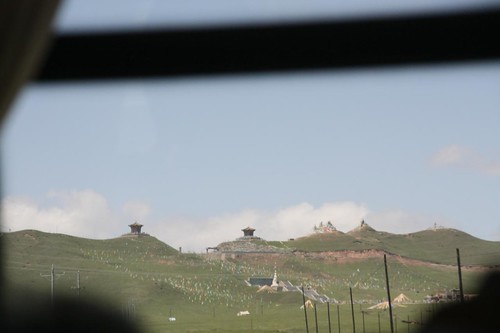
"The Daotang (backflowing) River springs from the west of the Riyue Mountain flowing west to the Qinghai Lake (the largest inland salt lake in China). Again there is a well-known legend concerning the Princess Wencheng. When she passed by the mountain, her tears of homesickness dropped and became the Daotang (Backflowing) River. Its flow westward symbolizes the princess’s resolution to never return. In fact, it is the only river flowing from the east to the west in China." - http://www.visitourchina.com/guide/riyue_mountain.htm
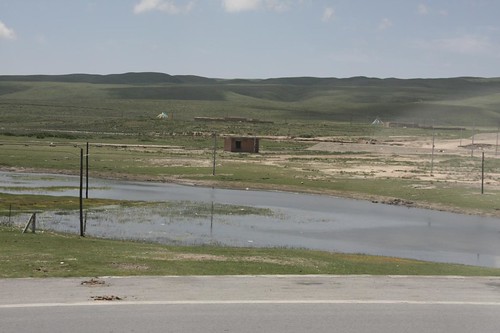
A tent, a yak herder and yaks. You will see a lot of yaks in the Qinghai-Tibet plateau.

Man on a horse
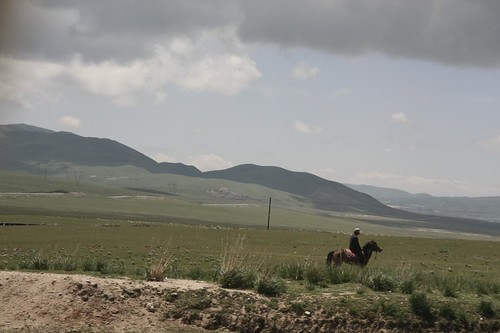
Dirtiest toilet I visited during my trip. The smell was the most pungent ever. The flush did not work. I supposed China's public toilets are infamous for their cleanliness. All of us who visited stayed outside until a cubicle is free. Then, we'd dash into one to execute our business. It took me a while to get used to visiting toilets that are extremely dirty and smelly. The condition was so off-putting, my system had difficulty adjusting initially and the business took longer than usual.

Store selling yak jerky. Photography was not allowed but I sneaked a shot. Fresh toothpicks were available for you to pick bits of the dried meat for trial. If you fancy a purchase, you can call one of the attendants. They will come with a bag to scope the meat in before weighing them. Some stores we went to in Lhasa vacuum-packed the meat for you. That way, you do not have to worry about smell or custom issues.

Outside the store

Xining woman in traditional attire
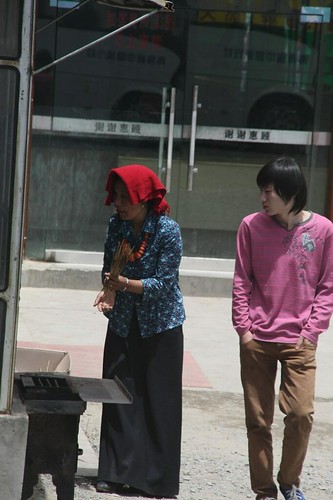
Xining farm houses

Religious building in Xining


No comments:
Post a Comment